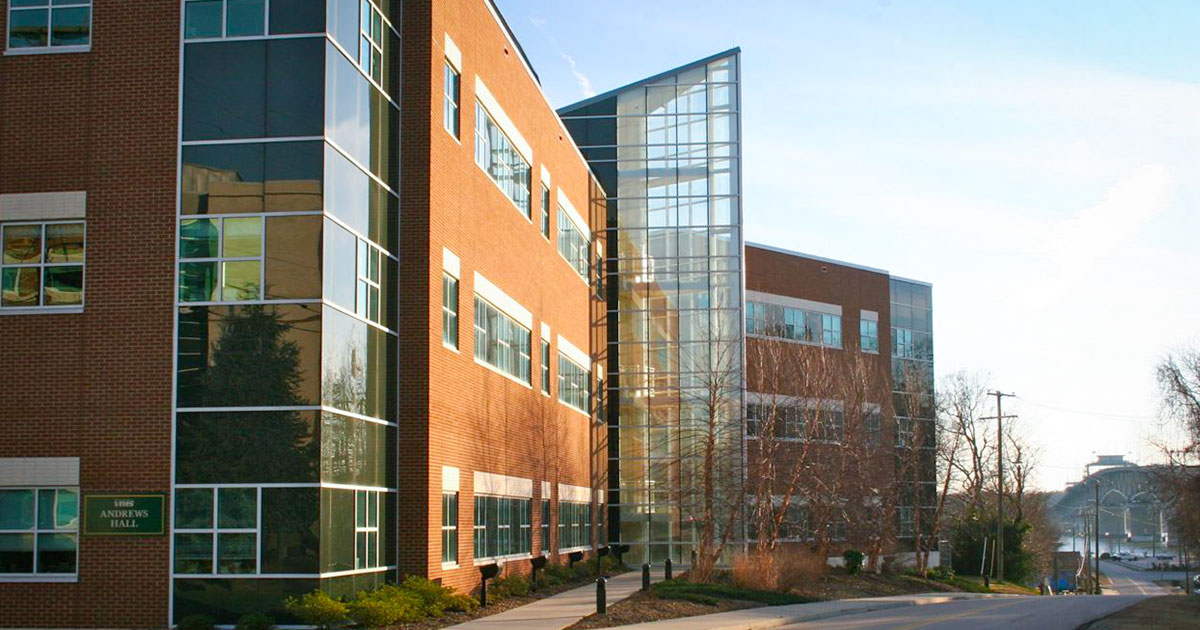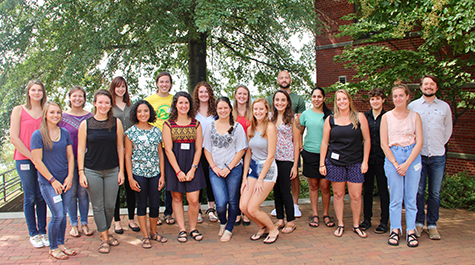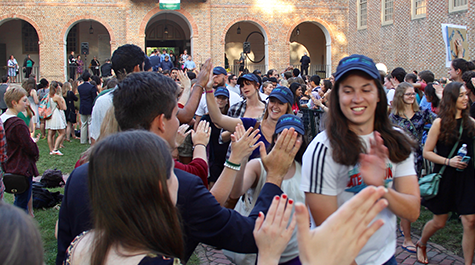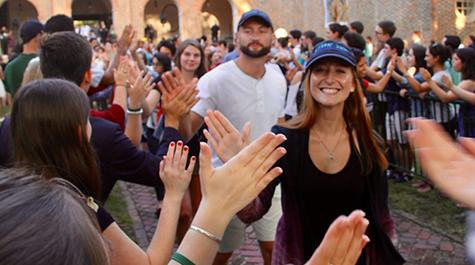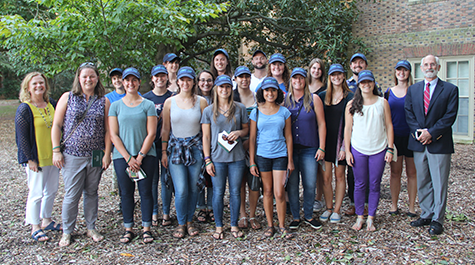Newest class of graduate students begins studies
The Virginia Institute of Marine Science officially welcomed 20 new graduate students to its Gloucester Point campus earlier this month. With their arrival, enrollment at William & Mary’s School of Marine Science at VIMS now stands at 92 students.
After careful consideration from the selection committee, this year’s incoming class consists of 14 master’s students and 6 doctoral students. Of these, 3 hail from Virginia, 15 are from out of state, and 2 are international students.
“Our incoming students are an exceptionally talented group,” says Professor Linda Schaffner, Associate Dean of Graduate Studies at VIMS. “They bring an extensive research background and diverse perspectives that will further enrich the graduate program at VIMS.”
While each student brings an impressive list of academic accomplishments, they also bring a remarkable set of personal achievements. Students in the matriculating class of 2017 have served as STEM educators in Virginia and Texas, and traveled the world with studies in Australia and the Galápagos Islands. The class can also boast of seven certified divers and an Eagle Scout.
“Members of this incoming class have authored academic articles, helped to design new tools for research efforts, and served as scientific stewards for the communities they live and work in,” says Schaffner.
A distinguished roster of researchers
- Samantha Askin spent summer 2016 as a Research Experience for Undergraduates student at VIMS while enrolled at the University of Georgia-Athens. She recently presented at a student symposium in Honolulu, Hawaii hosted by the Association for the Sciences of Limnology and Oceanography’s Multicultural Program.
- Andrew Corso will study larval fishes in Antarctica as part of his master’s studies alongside professors Deborah Steinberg, Eric Hilton, and Sarah Huber. As an undergraduate at W&M, he participated in a Woods Hole Oceanographic Institute program studying the Sargasso Sea.
- Fei Da will begin his PhD studies in Spring 2018 after completing his master’s degree at VIMS. Since beginning his studies in 2015, Da has been involved in the Biogeochemical Circulation Ocean Modeling laboratory led by Professor Marjy Friedrichs.
- Meredith Evans has helped to author publications and presentations on the effects of the Deepwater Horizon oil spill. She brings to VIMS extensive public outreach experience, coordinating the Summer Science and Women in Science Day programs at the University of Texas in 2015. She also served as Scientist in Residence for the Port Aransas, Texas school district during 2014-2015.
- Amanda Guthrie received a NOAA Ernest F. Hollings Scholarship as an undergraduate at the University of Miami. She has study-abroad experience in the Galápagos Islands, and previously interned at the Smithsonian Institution.
- Kyle Hinson was part of the Chesapeake Bay Program’s Science, Technical Assessment, and Reporting Team prior to starting his studies at VIMS. He is a graduate of the University of North Carolina-Chapel Hill.
- Chase Long has worked at VIMS since 2014 as a Laboratory Technician in Fisheries Science, where he studied Arctica islandica clams in the Molluscan Ecology laboratory of Professor Roger Mann.
- Katherine Longmire was awarded a Gates Millennium Scholarship while an undergraduate at the College of Charleston, where she also completed a Google Earth Ocean Layer Internship and spent time with the Mission Blue/Sylvia Earle Alliance. A member of VIMS’ 2015 REU class, she has worked at VIMS as a Marine Laboratory Technician since 2016.
- Lindsey Nelson comes to VIMS from the University of Washington–Seattle, where she spent 636 days at sea on 13 commercial vessels as a North Pacific Observer for the National Marine Fisheries Service.
- Kaitlyn O’Brien is a graduate of Humboldt State University, where she participated in a poster session at the American Fisheries Society’s California and Nevada chapter during the spring of 2017.
- Michelle Onofrio was part of VIMS’ 2016 REU class while studying at the College of New Jersey. While there, she spent time studying abroad in Australia.
- Kristen Prossner has been serving as a research assistant with Professpr Mike Unger in VIMS’ Environmental Chemistry program. She is a W&M graduate.
- Ann Ropp was a student aquarist as an undergraduate at Bowling Green State University. She studied abroad at James Cook University in Australia.
- Katherine (Annie) Schatz also spent time at James Cook University during her studies at Pitzer College in California. She also served as an ECOAmericorps volunteer on a NOAA project led by Lake Champlain Sea Grant.
- Adena Schonfeld comes to VIMS from the University of Miami, where she studied abroad in the Galápagos Islands.
- Serina Sebilian spent her summer as a Sally Casanova Pre-Doctoral Fellow alongside VIMS professor David Johnson. A graduate of both Florida International University and San Francisco State University, she’ll officially begin her studies in Spring 2018.
- Shelby White brings a commercial fishing background to VIMS. Previously employed by the North Carolina Division of Marine Fisheries, she received her undergraduate and Master’s degrees from the University of North Carolina – Wilmington.
- Stephanie Wilson was a Lead Aquarist during her undergraduate studies at Saint Francis University in Pennsylvania. She is a graduate of VIMS 2016 REU class.
The School of Marine Science at VIMS
One of W&M’s five graduate and professional programs, the School of Marine Science at VIMS includes 4 academic departments (Aquatic Health Sciences, Biological Sciences, Fisheries Science, and Physical Sciences) and confers both MS and PhD degrees in marine science.
The School of Marine Science at VIMS has granted more than 1,000 graduate degrees, making it one of the largest marine science graduate programs in the United States. SMS graduates have achieved diverse career paths in colleges and universities, government agencies, consulting firms, marine education and outreach organizations, NGOs, and industry around the world. A significant percentage of SMS graduates occupy research, management and policy positions in federal agencies such as NOAA, NMFS, EPA and USGS. More than 90% of SMS graduates have a job in the field of marine science at the time of graduation.
